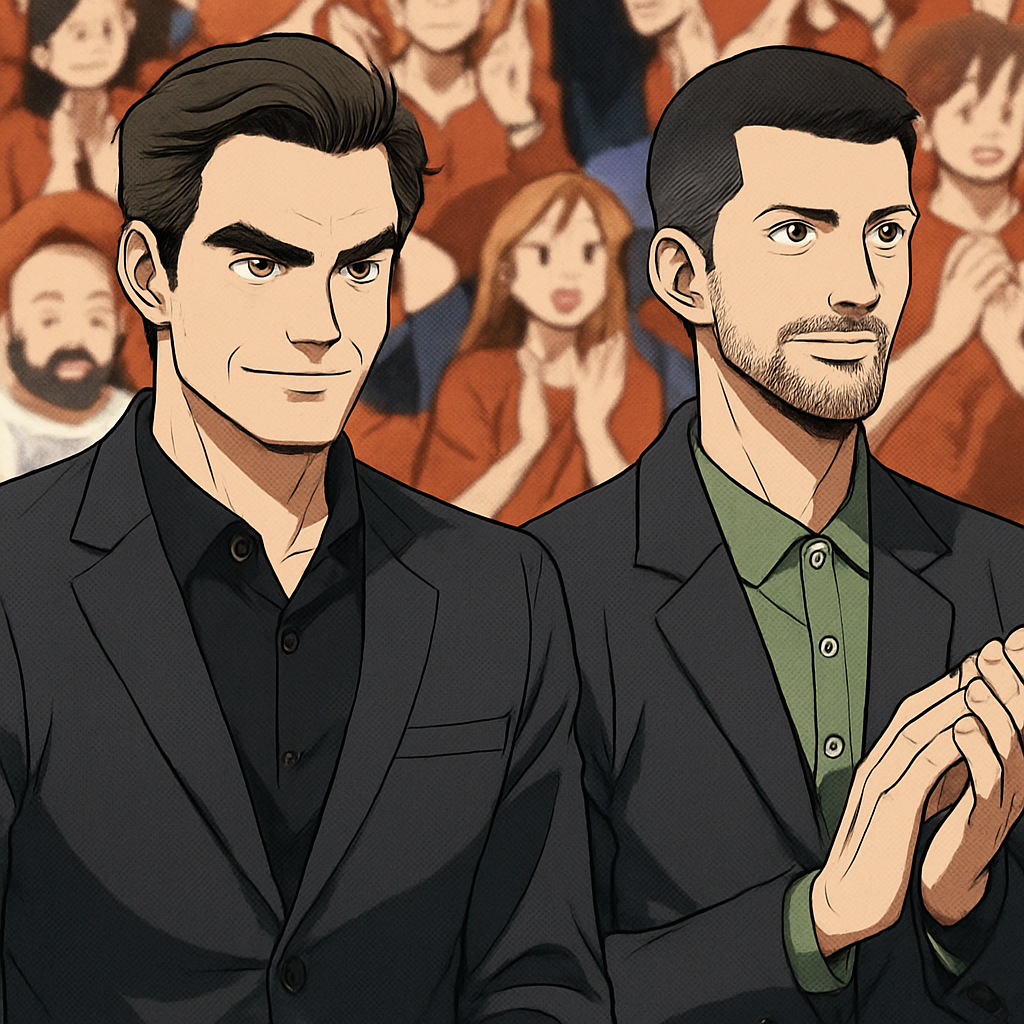The world of men's tennis, long defined by the epic rivalries of its 'Big Three', has entered a new, more reflective era. While Novak Djokovic continues to chase history on the court, the recently retired Roger Federer has been observing from the sidelines, offering poignant commentary on the relationships forged over two decades of intense competition. A recent, candid remark from Djokovic about the nature of their friendship—or lack thereof—has prompted a characteristically graceful and telling response from the Swiss Maestro, one that speaks volumes about his perspective on their shared past and a potential collaborative future.
Djokovic's Candid Admission
The spark for this latest chapter in their storied dynamic came from Novak Djokovic himself. In an interview with The Times, the 24-time Grand Slam champion was strikingly forthright about his relationship with his two greatest rivals. He stated that despite the immense respect shared between them, he and Federer were "never friends" in the way he has become with Rafael Nadal.
Djokovic elaborated, drawing a distinction between his connection with the Swiss and the Spanish legend. "I know certainly that we have a better relationship today than we had probably ever in our lives," he said of Nadal. "With Roger it’s just a different kind of relationship, let’s say." This admission, while blunt, was not delivered with malice but with a matter-of-fact honesty that has come to characterize the Serbian's later-career reflections.
Federer's Graceful and Forward-Looking Reply
Rather than taking offense or engaging in a war of words, Roger Federer's response was a masterclass in diplomacy and emotional intelligence. Speaking to The Daily Telegraph, Federer acknowledged the competitive fire that necessarily precluded a deep friendship during their playing days. He focused not on the past tension, but on a future of shared purpose.
"I think it’s going to be fascinating to see what happens next with Novak and also Rafa, what roles they’re going to have," Federer said. He then laid out a vision that captured the imagination of tennis fans worldwide: "We’ll have some good years of all three of us, hopefully, being able to spend some time together and reflect on the tour."
This perspective reframes the entire conversation. Federer is no longer dwelling on the on-court battles or the personal distance; he is looking ahead to a potential "summit" of the three legends, a meeting of the minds to share their unique experiences for the betterment of the sport they dominated.
The Foundation of Respect
Crucially, Federer made it clear that any future collaboration is built upon a bedrock of mutual respect earned through years of competition. "We’ll have some fun, which I think will be great. I think for the three of us, we’ll always be known as the three guys who were part of a great era and who pushed each other," he stated. This acknowledgment underscores that their legacy is inextricably linked—a triumvirate that elevated the game to unprecedented heights.
Federer's reply highlights several key themes that defined his career and his approach to rivalry:
- Professionalism Over Personal Affection: He implicitly agrees with Djokovic's core point—that their primary connection was through the sport. The intensity of their Grand Slam battles, with major titles so often on the line, created a dynamic where deep friendship was unlikely, if not impossible.
- A Matured Perspective: Retirement has afforded Federer a broader view. The petty disagreements and on-court tensions have faded, leaving behind a purified respect for each other's achievements and struggles.
- A Unified Legacy: Federer consistently speaks of the "three of us," understanding that their individual stories are chapters in a single, grand narrative of a golden era in tennis.
A Contrast in Personalities and Public Perception
The exchange also illuminates the enduring contrast between the two champions' public personas. Djokovic, often portrayed as the outsider battling the established fan favorites, has been more vocal about the personal slights and the difficulty of winning over crowds. His honesty about the relationship with Federer is consistent with his narrative of a harder, more solitary path to greatness.
Federer, meanwhile, has always curated an image of effortless grace and diplomacy. His response is perfectly in character: avoiding conflict, acknowledging the past without dwelling on it, and steering the conversation toward a positive, collective future. It’s a reminder that while they may not have been friends, Federer holds no visible bitterness, only a deep-seated respect for his rival's incredible talent and drive.
The Future: A "Big Three" Summit on the Horizon?
The most exciting element of Federer's reply is the prospect it raises. The idea of Federer, Nadal, and Djokovic—once they have all retired—coming together for a shared purpose is tantalizing. Federer hinted at this, suggesting their collective wisdom could be a powerful force for the sport. "We’ll have some good years ahead of us, I hope, to share with each other," he reiterated.
What form could this take? The possibilities are endless and thrilling for any tennis fan:
- Ambassadorial Roles: Joint appearances and initiatives through the ATP, Grand Slam committees, or their own foundations to promote tennis globally.
- Collaborative Business Ventures: Perhaps a shared academy or a series of exhibition events that celebrate their era.
- Mentorship: Offering their unique, combined experience to guide the next generation of players who must navigate the landscape they created.
In the end, Roger Federer's reply to Novak Djokovic's "never been friends" remark does more than just address a headline. It demonstrates a profound understanding that their story is bigger than any single match or personal dynamic. It is a narrative about three men who redefined excellence, pushed each other to their absolute limits, and in doing so, created a legacy that is collectively owned. Federer isn't interested in litigating the past; he's ready to build a future with his rivals, a future where their shared history becomes their greatest strength. The summit, it seems, is just a matter of time.

